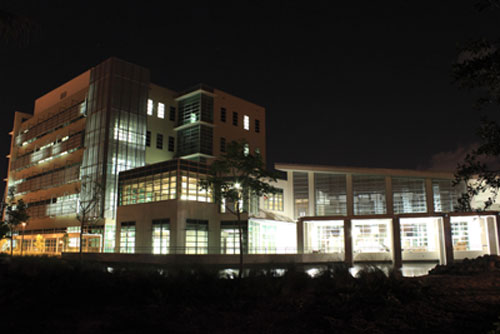The US Green Building Council’s South Florida Chapter has relocated its offices to Florida Atlantic University’s new College of Engineering & Computer Science Building.

Florida Atlantic University
“We are thrilled about this unique partnership,” says Robert Cannellos, president of the six-year-old nonprofit, volunteer-based USGBC South Florida Chapter. “Green buildings offer great hope for our economy, our environment and our future, and FAU’s administration, faculty, staff and students embrace the fact that sustainability and education are the keys to a prosperous future.”
“It’s an outstanding fit,” says Karl Stevens, dean of the College. “We’re honored to count the USGBC South Florida Chapter as a key partner in our new building. We look forward to sharing talents and expertise to educate, enlighten and empower our campus and the greater South Florida community to adopt an approach to building that is both ecologically and economically sustainable.”
The new 97,000 square foot “living learning laboratory” is anticipated to be the first academic building in southeast Florida to be designed and built to LEED (Leadership in Energy and Environmental Design) Platinum level standards.
The Leadership in Energy and Environmental Design (LEED) Green Building Rating System, overseen by the U.S. Green Building Council, is a voluntary, consensus-based national rating system for developing high-performance, sustainable buildings. LEED addresses all building types and emphasizes state-of-the-art “green” strategies in five areas: sustainable site development, water savings, energy efficiency, materials and resources selection, and indoor environmental quality. LEED Accredited Professionals (LEED APs) have demonstrated a thorough understanding of green building techniques and the LEED Green Building Rating System.
“The College of Engineering & Computer Science will place the University, College and local community at the national forefront of energy conservation and environmental stewardship efforts, as well as act as a catalyst for building sustainable infrastructures,” continues Dean Stevens. The facility was built with innumerable efficiencies designed to decrease the College’s carbon footprint.
The following are just a few examples:
- 75% recycled rate for waste generated by project construction
- 50% reduction in restroom fixture water demand
- 75% reduction in landscaping irrigation water demand
- 50% reduction in restroom flush fixture waste water generation
- 50% more energy efficient than a conventionally designed facility
- 75% of the occupied spaces will be naturally day lit
- 90% of the occupied spaces will have a window view
“Our new home is in a highly efficient, beautiful building in a dynamic educational setting that is in the center of our organization’s broad geographic region — what’s not to love? We couldn’t be more pleased to be asked to join the College of Engineering & Computer Science and FAU,” said Cannellos.
To learn more about the College of Engineering & Computer Science, visit www.eng.fau.edu. To contact Dean Stevens, call 561-297-3400.
